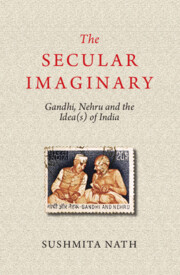Book contents
- Frontmatter
- Contents
- Preface
- Acknowledgements
- Introduction
- 1 Debating the Secular beyond the West
- 2 Gandhi’s Ashram and Political Thought: A Counter-narrative of Secularity
- 3 Gandhi’s Associationalism: A Non-state Alternative to Liberal Secularism?
- 4 Was Nehru Nehruvian? Religion, Secularity and Nehruism
- 5 Nehru and the Politics of Liberalism of Fear
- Conclusion
- Bibliography
- Index
5 - Nehru and the Politics of Liberalism of Fear
Published online by Cambridge University Press: 27 September 2022
- Frontmatter
- Contents
- Preface
- Acknowledgements
- Introduction
- 1 Debating the Secular beyond the West
- 2 Gandhi’s Ashram and Political Thought: A Counter-narrative of Secularity
- 3 Gandhi’s Associationalism: A Non-state Alternative to Liberal Secularism?
- 4 Was Nehru Nehruvian? Religion, Secularity and Nehruism
- 5 Nehru and the Politics of Liberalism of Fear
- Conclusion
- Bibliography
- Index
Summary
INTRODUCTION
If Gandhi's politics challenged British colonialism and politics, after India's independence, Nehru's political challenge was to create structures and styles of governance which were national rather than imperial. How could the inherited colonial structures and norms of government, which had evolved to meet imperial needs, be geared to serve the needs of a newly independent nation-state? Simultaneously, the newly formed nation-state's problems could not be considered in isolation from the rest of the world. For the first prime minister of independent India, the national problems needed to be understood in the context of a wider picture, that is, ‘in a world-setting’. Nehru, Sunil Khilnani remarks, was ‘a man whose hand certainly touched the wheel of history’. Not only did Nehru determine the shape and content of the independent state, his political judgements and their effects still shape the contexts in which Indians must today decide for themselves. ‘So much so, that much of India's recent politics can be seen as representing a range of evaluations on what Indians have taken to be Nehru's judgements.’ As such, to be in a position to make a retrospective historical assessment of Nehru's judgements, one needs to understand the basis of Nehru's own political judgements. In order to gain insight into the circumstances in which Nehru made political decisions, in this chapter, I will engage with his political actions in order to understand the role and relation of religion he envisaged vis-à-vis the state and society.
Nehru's political predilection was towards mass nationalism rather than liberal politics of constitutional reform introduced by the colonial government. Although, as early as 1924, Nehru had declared that he stood for complete independence from the British rule, throughout the late 1920s and 1930s his political vision increasingly came in conflict with the realities of nationalist politics with many Congressmen favouring constitutional reform (including Gandhi) and dominion status. Remarking on Nehru's dilemma, Judith Brown says, ‘ ... constitutional action was a snare for protagonists of a mass nationalism aiming for independence’. Nehru feared that the constitutional politics of the Indian National Congress (hereafter, the Congress) would strengthen a reformist mentality in the party and lock it in a collaborative enterprise with the British Raj.
- Type
- Chapter
- Information
- The Secular ImaginaryGandhi, Nehru and the Idea(s) of India, pp. 192 - 230Publisher: Cambridge University PressPrint publication year: 2022



